单元语法小专题 133
Unit+2+单元语法精讲与精练+单元写作小专题课件-2023-2024学年人教版英语八年级上册

单元语法知识精讲 频度副词的用法
1.频度副词的含义 (1)表示次数、频率的副词称为频度副词。常用的频度副词按频率发生的 高 低 依 次 为 : always(100%)>usually(80%)> sometimes(60%)> seldom(30%)> hardly ever(10%)> never(0%)。 (2)表示具体的频率、次数时,一次用 once,两次用 twice,三次或三次以 上用“基数词+times”表示:three times,four times,six times 等。
ห้องสมุดไป่ตู้
热点写作演练 假设你是李华,请给你的美国笔友 Tom 写一封信,谈谈你的课余时间参 加课外活动的情况。 内容包括: 1.介绍你们学校开展的课外活动; 2.叙述你的一次课外 活动经历; 3.说说你的体会。
要求:1.语言通顺,意思连贯,书写规范;2.80 词左右。书信开头 和结尾已给出,不计入总词数。
Dear Tom, How's it going?Let me tell you something about our after-school
activities.
WWeehahvaevelotlostsofoaf ftaeftrers-scchhooooll aaccttiiviittieisesininoouurr sscchhooooll ffoorr ouurr ffrreee ttiimmee..TThheerreeaarereovoevre2r02s0tusdteundtesn'tcslu'bcsliunbosuirnscohuorosl.cThhoeorle.aTrheearret acrluebasr,t cblauskbest,bablal sckluebtbs,alml ucslicubcslu,bmsuasnidc scolounbs.I aonftdensoexoernc.iIseoifntmeny efrxeeerctiimse iandmyI farmeeintitmhee abnadskIetabmalilnatnhde cbhaessksectlbuablsl.Waendofctheensshacvleubas.bWaeskoeftbtaelnl hmaavtechaonbaFsrkiedtabya.AllftemraetvcehryongaFmrei,dawy.eAafrteevrereyvetirryedgbamuet ,exwceiteadr.We hvaetr'ys tmiorreed, bIutalesoxcpiltaeyd.cWhheasts'ws imtohrem,yI callassompaltaeys cthhersees wtiimthesmya cwlaeesksmaftteesr tschhroeoel.times a w
人教版七年级英语上册Unit 2同步练习题及答案单元语法小专题(Grammar Focus)
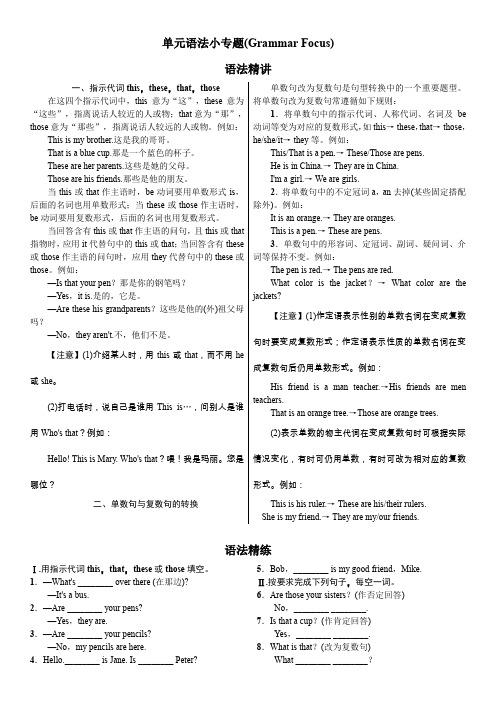
单元语法小专题(Grammar Focus)语法精讲一、指示代词this,these,that,those在这四个指示代词中,this意为“这”,these意为“这些”,指离说话人较近的人或物;that意为“那”,those意为“那些”,指离说话人较远的人或物。
例如:This is my brother.这是我的哥哥。
That is a blue cup.那是一个蓝色的杯子。
These are her parents.这些是她的父母。
Those are his friends.那些是他的朋友。
当this或that作主语时,be动词要用单数形式is,后面的名词也用单数形式;当these或those作主语时,be动词要用复数形式,后面的名词也用复数形式。
当回答含有this或that作主语的问句,且this或that 指物时,应用it代替句中的this或that;当回答含有these 或those作主语的问句时,应用they代替句中的these或those。
例如:—Is that your pen?那是你的钢笔吗?—Yes,it is.是的,它是。
—Are these his grandparents?这些是他的(外)祖父母吗?—No,they aren't.不,他们不是。
【注意】(1)介绍某人时,用this或that,而不用he 或she。
(2)打电话时,说自己是谁用This is…,问别人是谁用Who's that?例如:Hello! This is Mary. Who's that?喂!我是玛丽。
您是哪位?二、单数句与复数句的转换单数句改为复数句是句型转换中的一个重要题型。
将单数句改为复数句常遵循如下规则:1.将单数句中的指示代词、人称代词、名词及be 动词等变为对应的复数形式,如this→ these,that→ those,he/she/it→ they等。
例如:This/That is a pen.→ These/Those are pens.He is in China.→ They are in China.I'm a girl.→ We are girls.2.将单数句中的不定冠词a,an去掉(某些固定搭配除外)。
人教版七年级英语上册:Unit4 单元语法小专题【练习】

单元语法小专题(Grammar Focus~3c),01语法精讲一、方位介词的用法英语中,当要表示某人或某物在某地时,通常要借助于方位介词。
方位介词不能单独充当句子成分,必须与其他词或短语构成介词短语放在be动词或其他动词后面作表语或状语等,也可放在名词后作定语。
下面我们来看一下本单元学到的三个方位介词。
1.on意为“在……上”,表示一个物体在另一个物体的表面上。
例如:The book is on the desk.那本书在书桌上。
2.in意为“在……里”,表示一个物体在另一个物体的内部。
例如:The dictionary is in the schoolbag.字典在书包里。
3.under意为“在……下”,表示一个物体在另一个物体的正下方,但两个物体并不接触。
例如:Is the baseball under the chair?棒球在椅子下面吗?二、where引导的特殊疑问句1.用法where是疑问副词,意为“在哪里;到哪里”,用来引导特殊疑问句。
常用句型“Where is+单数名词/代词?”或“Where are+复数名词/代词?”询问人或物所在的位置。
例如:Where is my eraser?我的橡皮在哪里?Where is she?她在哪儿?Where are the keys?钥匙在哪里?Where are they?他们在哪儿?2.答语(1)用It's…(对应Where is…?)或They're…(对应Where are…?)作答。
例如:—Where is my eraser?我的橡皮在哪里?—It's in your pencil box.它在你的铅笔盒里。
—Where are the keys?钥匙在哪里?—They're under the bed.它们在床下面。
(2)直接说出物品所在地点,省略it's或they're。
例如:—Where's the clock?时钟在哪里?—On the wall.在墙上。
专题13 重点语法情态动词can的用法(知识点全覆盖)-七年级英语下(人教版)

人教版七年级下学期期中复习查缺补漏冲刺满分(单元重点语法)专题13 重点语法情态动词can的用法一、单项选择1.—Can your parents sing and dance?—________. And they do them very well.A.Yes, they do B.No, they don’t C.No, they can’t D.Yes, they can 2.—Hi! Can you play ping-pong?—________.A.Yes, I am B.No, I can’t C.Yes, I can’t3.—Can he go to Sanya with us?—No, he ________. His father is in hospital.A.can’t B.isn’t C.doesn’t4.You ________ watch TV, but you have to clean the room first.A.must B.can C.can’t5.—May I use your bike, Jack?—Of course you ________. I don’t use it.A.must B.mustn’t C.can D.can’t6.I moved to a new flat and it’s close to my office. Now I ________ walk to work instead of going by car.A.should B.must C.can D.need7.— Wang Hui, you must finish your homework first, or you ______ watch TV.— OK, Mom.A.couldn’t B.needn’t C.can’t8.—Can I take the book out of the reading room?—No, you ________. You ________ read it here. It’s the rule.A.can; must B.don’t have to; mustC.can’t; have to D.mustn’t; can9.—Can I listen to music in class?—________. But you can listen to music in the hallways.A.Yes, you do B.No, you don’t C.Yes, you can D.No, you can’t10.—Look at Sylvia, her performance is really funny.—Yes, she can stand on her head, but she ________ walk on her hands.A.can B.can’t C.like D.don’t like 11.—Can you play chess?—________. I think it’s easy.A.Yes, I do B.No, I don’tC.Yes, I can D.No, I can’t12.Cars, buses and bikes ________ stop when the traffic lights change to red.A.can B.may C.must D.need13.My grandma ________ read or write. She didn’t go to school when she was young. A.can B.must C.can’t14.I need to have my glasses because I ________ see the blackboard.A.must B.mustn’t C.can D.can’t 15.Could you please speak a little louder? I ________ hear you very well.A.can’t B.mustn’t C.should’t D.needn’t 16.— Mom, ________ I play computer games this evening?— Sure, but you ________ finish your homework first.A.can; must B.can; mustn’t C.may; could D.may; can’t 17.— Listen! Is that Linda playing the piano in the room?— No. It ________ be Linda. She is in London these days.A.may not B.needn’t C.can’t D.mustn’t 18.—Can I use your pen, Mr. Smith?—Of course, you ________.A.can B.must C.may D.need 19.— This robot is great.— Wow, it has video cameras in its eyes, so it ________ “see” and interact(交流)with people. A.may B.can C.must D.should20.I ________ ride a bike, but I ________ drive a car.A.can, can B.can’t, can’t C.can, can’t 21.—Must I wash my clothes today?—I’m afraid you ________. You should learn to do something by yourself.A.need B.have to C.can D.could22.— Can you play volleyball every week?— ________. We play it on Wednesdays and Sundays.A.Yes, we do B.No, we don’t C.No, we can’t D.Yes, we can 23.I _______ play tennis but I _______ play table tennis.A.can; can’t B.can; can C.can’t; can’t24.I _______ play tennis but I _______ play table tennis.A.can; can’t B.can; can C.can’t; can’t25.—________ you play _________ basketball?—No, I can’t.A.Do; the B.Can; the C.Can; /D.Are; / 26.—Lisa,________ you speak French?—Yes, but only a little.A.may B.can C.must D.should 27.At the age of five, Jeff ________ play the guitar very well.A.could B.can C.must D.should 28.Tom can’t play basketball on school days, but he ________ play it on weekends. A.must B.can C.have to D.should 29.—Can John swim?— _________. But he can dance.A.Yes, he can B.No, he doesn’t C.Yes, he do D.No, he can’t 30.— Can Linda dance?— ________. But she can sing.A.Yes, she can B.No, she can’t C.Yes, she does D.No, she doesn’t 31.— Can Lily swim?— Yes, she ________.A.is B.can C.do D.does 32.—Jack, _________ you ride a bike?—Yes, I can.A.can B.may C.needn’t D.must 33.—Are the glasses Tim’s?—No, they _________ be his. He doesn’t wear glasses.A.must B.can C.mustn’t D.can’t 34.Why _________ he have a talk with her? _________ he do it tomorrow? A.may; May B.must; May C.can; Must D.can; Need 35.How _________ you be so busy?A.must B.need C.will D.can 36.—_________ you play football with us?—Sorry, I _________. I _________ tidy my room.A.Will; won’t; must B.Could; couldn’t; could C.Can; can’t; have to D.May; may not; must37.—_________ the exam paper be handed in right now?—No, it doesn’t have to. You may hand it in before 11:30.A.Can B.Must C.Should D.May 38.—Where is my umbrella?—It’s fine today. You _________ take an umbrella with you.A.can’t B.needn’t C.mustn’t D.shouldn’t 39.Henry _________ be at home because he telephoned me from Beijing just a moment ago.A.needn’t B.isn’t able to C.can’t D.does 40.—Listen! Is that Kate playing the piano in the room?—No. It _________ be Kate. She has gone to London.A.may not B.needn’t C.mustn’t D.can’t二、用所给单词的正确形式填空41.David can ________ (swim).42.His brother Tim can ________ (dance) very well.43.Listen! He can _________ (speak) much French.44.________(can)you help me out?45.I can't ________ (play) with you. I must do my homework.46.He can ____(play)the guitar on weekends.47.Can Bill ____(write)stories or tell stories?48.I can dance,but I ____(can )sing.49.Can you and Jane____ (join)the art club?50.Can your brother _____(play)the drums?三、完成句子51.–他们会舞龙吗?-不会。
人教版(河北专版)九年级英语上册练习 Unit 1 单元语法小专题
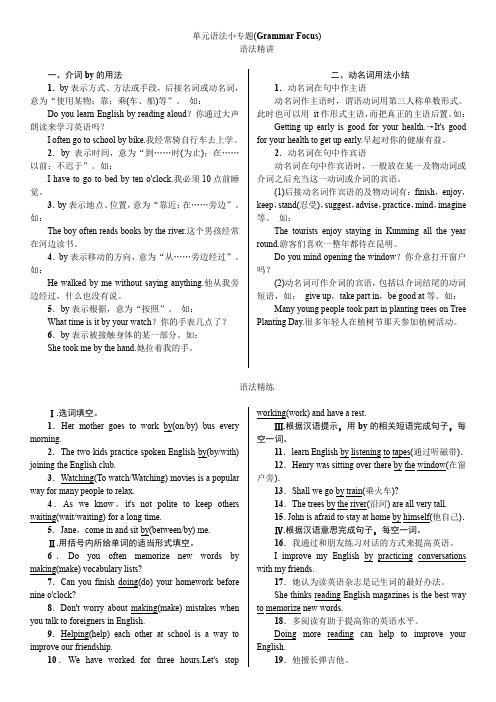
单元语法小专题(Grammar Focus)语法精讲一、介词by的用法1.by表示方式、方法或手段,后接名词或动名词,意为“使用某物;靠;乘(车、船)等”。
如:Do you learn English by reading aloud?你通过大声朗读来学习英语吗?I often go to school by bike.我经常骑自行车去上学。
2.by表示时间,意为“到……时(为止);在……以前;不迟于”。
如:I have to go to bed by ten o'clock.我必须10点前睡觉。
3.by表示地点、位置,意为“靠近;在……旁边”。
如:The boy often reads books by the river.这个男孩经常在河边读书。
4.by表示移动的方向,意为“从……旁边经过”。
如:He walked by me without saying anything.他从我旁边经过,什么也没有说。
5.by表示根据,意为“按照”。
如:What time is it by your watch?你的手表几点了?6.by表示被接触身体的某一部分。
如:She took me by the hand.她拉着我的手。
二、动名词用法小结1.动名词在句中作主语动名词作主语时,谓语动词用第三人称单数形式。
此时也可以用it作形式主语,而把真正的主语后置。
如:Getting up early is good for your health.→It's good for your health to get up early.早起对你的健康有益。
2.动名词在句中作宾语动名词在句中作宾语时,一般放在某一及物动词或介词之后充当这一动词或介词的宾语。
(1)后接动名词作宾语的及物动词有:finish,enjoy,keep,stand(忍受),suggest,advise,practice,mind,imagine 等。
2020年秋人教版八年级上册英语 unit 3单元语法小专题

单元语法小专题(Grammar Focus)语法精讲形容词、副词的比较级1.概念:英语中大多数形容词、副词有三个等级:原级、比较级和最高级。
两者比较用比较级;三者或三者以上相比用最高级。
比较的对象必须是属于同一性质或范畴的人或物。
【注意】比较的对象必须一致;比较的双方必须在同一范围内。
表示两者在某一方面相同时,用“as+形容词或副词原级+as”的句型。
如:I think science is as important as math.我认为科学和数学一样重要。
表示一方在某一方面不及另一方时,用“not as/so+形容词或副词原级+as”的句型。
如:It is not as/so warm today as yesterday.今天不如昨天暖和。
语法精练Ⅰ.用括号内所给单词的适当形式填空。
1.I think Sally did as ________(better) as Lucy in the math competition.2.Linda is much ________ (hard-working) than Anna.3.Who has ________ (many) books,Zhang Li or Li Ying?4.Do you think you are ________ (outgoing) than your father?5.It was cold yesterday,but it is much ________ (cold) today.6.This box is much ________(heavy),isn't it?7.Who is ________ (funny) than you in your class?8.I work ________(hard) this term,but David works even ________(hard).9.Which day was ________(hot),today or yesterday?10.This story is very ________(interesting),but that story is ________(interesting) than this one.Ⅱ.按要求完成下列句子,每空一词。
《名校课堂》八年级(上册)英语

湖北世纪华章文化传播有限公司公司简介湖北世纪华章文化传播有限公司创建于2001年,是一家以中小学教育辅导类图书开发为重点,集内容策划、出版发行于一体的民营股份制企业,是全国一流的基础教育图书供应商。
公司成功研发出版的《名校课堂》、《火线100天》等系列图书已经成为全国中小学教育类图书的一线品牌,每年有2000余万人次中小学生、98万余人次的教师、超过4.8万所学校使用本公司的图书,产品畅销不衰。
目前,公司拥有4项注册商标、一项国家专利,并与广西师范大学出版社、黑龙江教育出版社、北京市海淀区教师进修学校、黄冈市教育科学研究院等全国知名出版社、教育研发机构深度合作,重点研发教育类图书、报刊、网站等项目。
公司宗旨:服务教师、服务教学、服务教育公司使命:以图书出版推动教育进步公司愿景:让每一位学生以较小的成本分享到高品质的教育英语八年级(上册)Word 版习题导学案教学资源包Unit 1 Where did you go on vacation?Unit 2 How often do you exercise?Unit 3 I'm more outgoing than my sister.Unit 4 What's the best movie theater?Unit 5 Do you want to watch a game show? Unit 6 I'm going to study computer science. Unit 7 Will people have robots?Unit 8 How do you make a banana milk shake? Unit 9 Can you come to my party?Unit 10 If you go to the party, you'll have agreat time!Unit 1 Where did you go on vacation?第一课时单元语法小专题(Grammar Focus)第二课时话题阅读与交际第三课时第四课时单元重难点题组训练单元写作小专题&Section B(3a ~ 4)Self CheckTest for Unit 1Unit 2 How often do you exercise?第一课时单元语法小专题(Grammar Focus)第二课时话题阅读与交际第三课时第四课时单元重难点题组训练单元写作小专题&Section B(3a ~ 4)Self CheckTest for Unit 2Unit 3 I'm more outgoing than my sister.第一课时单元语法小专题(Grammar Focus)第二课时话题阅读与交际第三课时第四课时单元重难点题组训练单元写作小专题&Section B(3a ~ 4)Self CheckTest for Unit 3Unit 4 What's the best movie theater?第一课时单元语法小专题(Grammar Focus)第二课时话题阅读与交际第三课时第四课时单元重难点题组训练单元写作小专题&Section B(3a ~ 4)Self CheckTest for Unit 4Unit 5 Do you want to watch a game show?第一课时单元语法小专题(Grammar Focus)第二课时话题阅读与交际第三课时第四课时单元重难点题组训练单元写作小专题&Section B(3a ~ 4)Self CheckTest for Unit 5Unit 6 I'm going to study computer science.第一课时单元语法小专题(Grammar Focus)第二课时话题阅读与交际第三课时第四课时单元重难点题组训练单元写作小专题&Section B(3a ~ 4)Self CheckTest for Unit 6Unit 7 Will people have robots?第一课时单元语法小专题(Grammar Focus)第二课时话题阅读与交际第三课时第四课时单元重难点题组训练单元写作小专题&Section B(3a ~ 4)Self CheckTest for Unit 7Unit 8 How do you make a banana milk shake?第一课时单元语法小专题(Grammar Focus)第二课时话题阅读与交际第三课时第四课时单元重难点题组训练单元写作小专题&Section B(3a ~ 4)Self CheckTest for Unit 8Unit 9 Can you come to my party?第一课时单元语法小专题(Grammar Focus)第二课时话题阅读与交际第三课时第四课时单元重难点题组训练单元写作小专题&Section B(3a ~ 4)Self CheckTest for Unit 9Unit 10 If you go to the party, you'll have a great time!第一课时单元语法小专题(Grammar Focus)第二课时话题阅读与交际第三课时第四课时单元重难点题组训练单元写作小专题&Section B(3a ~ 4)Self CheckTest for Unit 10Unit 1 Where did you go on vacation?Unit 2 How often do you exercise?Unit 3 I'm more outgoing than my sister.Unit 4 What's the best movie theater?Unit 5 Do you want to watch a game show? Unit 6 I'm going to study computer science. Unit 7 Will people have robots?Unit 8 How do you make a banana milk shake? Unit 9 Can you come to my party?Unit 10 If you go to the party, you'll have agreat time!电子导学案第一课时第二课时第四课时第三课时导学案课件第一课时第二课时第四课时第三课时第五课时第五课时Unit 1 Where did you go on vacation?电子导学案第一课时第二课时第四课时第三课时导学案课件第一课时第二课时第四课时第三课时第五课时第五课时Unit 2 How often do you exercise?Unit 3 I'm more outgoing than my sister.电子导学案第一课时第二课时第四课时第三课时导学案课件第一课时第二课时第四课时第三课时第五课时第五课时Unit 4 What's the best movie theater?电子导学案第一课时第二课时第四课时第三课时导学案课件第一课时第二课时第四课时第三课时第五课时第五课时Unit 5 Do you want to watch a game show?电子导学案第一课时第二课时第四课时第三课时导学案课件第一课时第二课时第四课时第三课时第五课时第五课时Unit 6 I'm going to study computer science.电子导学案第一课时第二课时第四课时第三课时导学案课件第一课时第二课时第四课时第三课时第五课时第五课时第二课时Unit 7 Will people have robots?电子导学案第一课时第二课时第四课时第三课时导学案课件第一课时第四课时第三课时第五课时第五课时Unit 8 How do you make a banana milk shake?电子导学案第一课时第二课时第四课时第三课时导学案课件第一课时第二课时第四课时第三课时第五课时第五课时Unit 9 Can you come to my party?电子导学案第一课时第二课时第四课时第三课时导学案课件第一课时第二课时第四课时第三课时第五课时第五课时电子导学案第一课时第二课时第四课时第三课时导学案课件第一课时第二课时第四课时第三课时第五课时第五课时Unit 10 If you go to the party, you'll have agreat time!听力材料听力录音教学资源包8年级导学案教学资源包进入论坛Word 版习题优质课件。
人教版七年级上册英语单元语法小专题(grammarfocus)
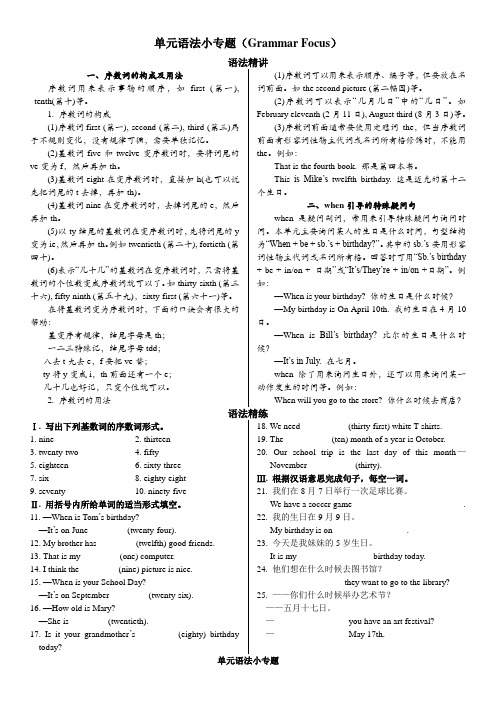
单元语法小专题(Grammar Focus)语法精讲一、序数词的构成及用法序数词用来表示事物的顺序,如first (第一), tenth(第十)等。
1. 序数词的构成(1)序数词first (第一), second (第二), third (第三)属于不规则变化,没有规律可循,需要单独记忆。
(2)基数词five和twelve变序数词时,要将词尾的ve变为f,然后再加-th。
(3)基数词eight在变序数词时,直接加-h(也可以说先把词尾的t去掉,再加-th)。
(4)基数词nine在变序数词时,去掉词尾的e,然后再加-th。
(5)以-ty结尾的基数词在变序数词时,先将词尾的y 变为ie,然后再加-th。
例如twentieth (第二十), fortieth (第四十)。
(6)表示“几十几”的基数词在变序数词时,只需将基数词的个位数变成序数词就可以了。
如thirty-sixth (第三十六), fifty-ninth (第五十九),sixty-first (第六十一)等。
在将基数词变为序数词时,下面的口诀会有很大的帮助:基变序有规律,结尾字母是th;一二三特殊记,结尾字母tdd;八去t九去e,f要把ve替;ty将y变成i,th前面还有一个e;几十几也好记,只变个位就可以。
2. 序数词的用法(1)序数词可以用来表示顺序、编号等,但要放在名词前面。
如the second picture (第二幅图)等。
(2)序数词可以表示“几月几日”中的“几日”。
如February eleventh (2月11日), August third (8月3日)等。
(3)序数词前面通常要使用定冠词the,但当序数词前面有形容词性物主代词或名词所有格修饰时,不能用the。
例如:That is the fourth book. 那是第四本书。
This is Mike’s twelfth birthday.这是迈克的第十二个生日。
单元语法小专题(Grammar Focus)
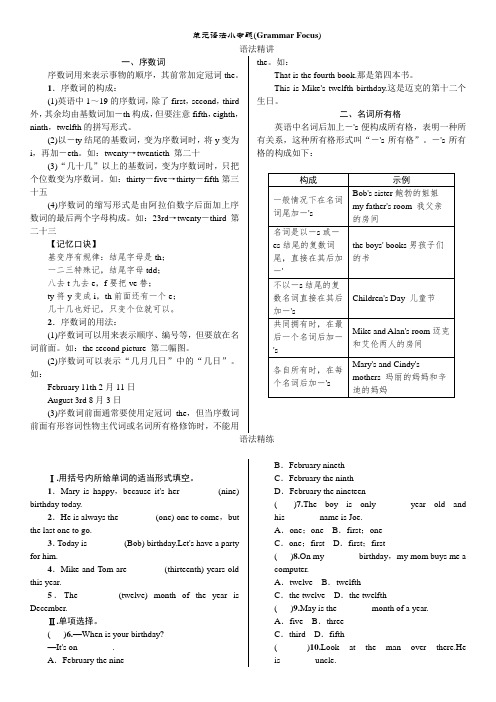
单元语法小专题(Grammar Focus)语法精讲一、序数词序数词用来表示事物的顺序,其前常加定冠词the。
1.序数词的构成:(1)英语中1~19的序数词,除了first,second,third 外,其余均由基数词加-th构成,但要注意fifth,eighth,ninth,twelfth的拼写形式。
(2)以-ty结尾的基数词,变为序数词时,将y变为i,再加-eth。
如:twenty→twentieth 第二十(3)“几十几”以上的基数词,变为序数词时,只把个位数变为序数词。
如:thirty-five→thirty-fifth第三十五(4)序数词的缩写形式是由阿拉伯数字后面加上序数词的最后两个字母构成。
如:23rd→twenty-third第二十三【记忆口诀】基变序有规律:结尾字母是th;一二三特殊记,结尾字母tdd;八去t九去e,f要把ve替;ty将y变成i,th前面还有一个e;几十几也好记,只变个位就可以。
2.序数词的用法:(1)序数词可以用来表示顺序、编号等,但要放在名词前面。
如:the second picture 第二幅图。
(2)序数词可以表示“几月几日”中的“几日”。
如:February 11th 2月11日August 3rd 8月3日(3)序数词前面通常要使用定冠词the,但当序数词前面有形容词性物主代词或名词所有格修饰时,不能用the。
如:That is the fourth book.那是第四本书。
This is Mike's twelfth birthday.这是迈克的第十二个生日。
二、名词所有格英语中名词后加上-'s便构成所有格,表明一种所有关系,这种所有格形式叫“-'s所有格”。
-'s所有格的构成如下:语法精练Ⅰ.用括号内所给单词的适当形式填空。
1.Mary is happy,because it's her ________(nine) birthday today.2.He is always the ________(one) one to come,but the last one to go.3.Today is ________(Bob) birthday.Let's have a party for him.4.Mike and Tom are ________(thirteenth) years old this year.5.The ________(twelve) month of the year is December.Ⅱ.单项选择。
人教九年级英语上册课件:Unit 5 单元语法小专题(Grammar Focus)

• 一般现在时的被动语态
• 英语中的语态共有两种:主动语态和被 动语态。主动语态表示主语是动作的执 行者;被动语态表示主语是动作的承受 者。本单元的重点是一般现在时的被动 语态,其用法如下:
• 1.一般现在时的被动语态的结构是“be done”,即“am/is/are done”。
• Ⅰ.单项选择。
• (D )1.I can’t understand what the
book is about because it
in
English.
• A.writes
• B.will write
• C.will be written
• D.is written
• C( )2.The pet dog is warm and
• B.doesn’t allow
• C.didn’t allow
• D.wasn’t allowed
• C( )4.Students
not to use
mobile phones in our school now.
• A.ask
• B.asked
• C.are asked
• D.were asked
to
• 3.老板每个月都会按时给我们酬劳。 • Waere paid by the boss on time
every month.
• 4.当茶叶成熟以后,它们被手工采摘并 被送去加工。
• When the tea leaves are ready,they are
picked
and then
fobryprhoacnedssing. are sent
七年级英语人教版上册《Unit 3 Is this your pencil》习题 单元语法小专题(Grammar Focus)【含答案】
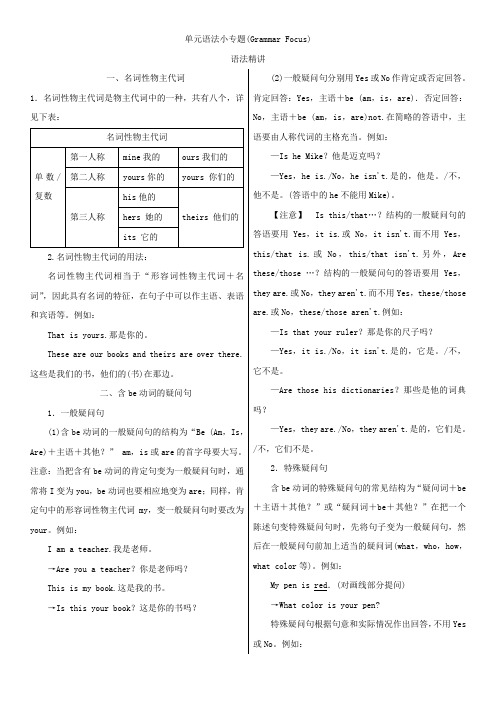
单元语法小专题(Grammar Focus)语法精讲一、名词性物主代词1.名词性物主代词是物主代词中的一种,共有八个,详见下表:2.名词性物主代词的用法:名词性物主代词相当于“形容词性物主代词+名词”,因此具有名词的特征,在句子中可以作主语、表语和宾语等。
例如:That is yours.那是你的。
These are our books and theirs are over there.这些是我们的书,他们的(书)在那边。
二、含be动词的疑问句1.一般疑问句(1)含be动词的一般疑问句的结构为“Be (Am,Is,Are)+主语+其他?” am,is或are的首字母要大写。
注意:当把含有be动词的肯定句变为一般疑问句时,通常将I变为you,be动词也要相应地变为are;同样,肯定句中的形容词性物主代词my,变一般疑问句时要改为your。
例如:I am a teacher.我是老师。
→Are you a teacher?你是老师吗?This is my book.这是我的书。
→Is this your book?这是你的书吗?(2)一般疑问句分别用Yes或No作肯定或否定回答。
肯定回答:Yes,主语+be (am,is,are).否定回答:No,主语+be (am,is,are)not.在简略的答语中,主语要由人称代词的主格充当。
例如:—Is he Mike?他是迈克吗?—Yes,he is./No,he isn't.是的,他是。
/不,他不是。
(答语中的he不能用Mike)。
【注意】Is this/that…?结构的一般疑问句的答语要用Yes,it is.或No,it isn't.而不用Yes,this/that is.或No,this/that isn't.另外,Are these/those …?结构的一般疑问句的答语要用Yes,they are.或No,they aren't.而不用Yes,these/those are.或No,these/those aren't.例如:—Is that your ruler?那是你的尺子吗?—Yes,it is./No,it isn't.是的,它是。
新人教版八年级下册英语Unit 4语法作文专练3 单元语法小专题(Grammar Focus)

单元语法小专题(Grammar Focus)语法精讲一、提建议的常用表达方式1.表示建议的常用句型——“建言献策”六法(1)直接建议法。
常用“Let's+动词原形”。
如:Let's go and see them.我们去看看他们吧。
(2)委婉建议法。
常用“Shall we+动词原形?”或“Could you please…?”。
如:Shall we go to the zoo?我们去动物园好吗?Could you please help me clean the room?能请你帮我打扫房间吗?(3)征求性建议法。
常用“How about/What about+名词或v.-ing形式?”。
如:What about this hotel?这家宾馆怎么样?How about going swimming?去游泳怎么样?(4)劝告性建议法。
常用“had better+动词原形”。
如:You'd better go to school on foot.你最好步行去学校。
(5)责备性建议法。
常用“Why not+动词原形?”或“Why don't you+动词原形?”。
如:Why not go and ask the teacher?=Why don't you go and ask the teacher?为什么不去问一下老师呢?(6)请求性建议法。
常用“Would you like+名词或动词不定式?”。
如:Would you like some bananas?你想吃香蕉吗?Would you like to play games with us?你想和我们一起玩游戏吗?2.回答建议的常用句型(1)肯定回答:OK./All right./Great.好的。
/行。
/太好了。
Good idea!/That's a good idea!好主意!/那是个好主意!That sounds great/good/…(那)听起来很棒/好/……Yes,please./Yes,I'd love to.是的。
人教版九年级英语上册课件:Unit 2单元语法小专题(Grammar Focus)
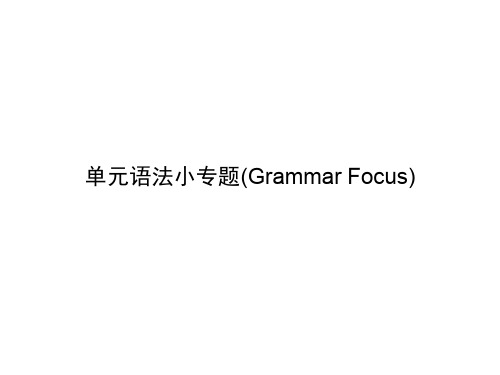
• Ⅰ.用what,what a(n)或how填空。 • 1.How fast you run!
• 2W.hat a pretty girl your daughter is!
What
• 3. moWmheatnt!
good news it is at the
• 4.How clever boys your class has!
• Ⅱ.单项选择。
• A( )1.—
sweet music!
• —And I really like the TV program The Voice of China.
• A.What
• B.What a
• C.How
• D.How a
Daming.He still looks angry.
• A.if have you mentioned
• B.what have you mentioned
• C.if you have mentioned
• D.what you have mentioned
• A( )6.I know
I promised to
•What a kind girl
she is!
• I wonder if/whether he will listen to me.
• 我想知道他是否会听我的话。
• 考点三:否定转移
• 当主句谓语动词为think,believe, suppose,imagine等时,若宾语从句表 否定意义,要将宾语从句的否定形式转 移到主句中,即否定前移。
• I don’t think that Jack can finish his homework by himself.
八年级英语人教版上册练习:Unit 5 单元语法小专题
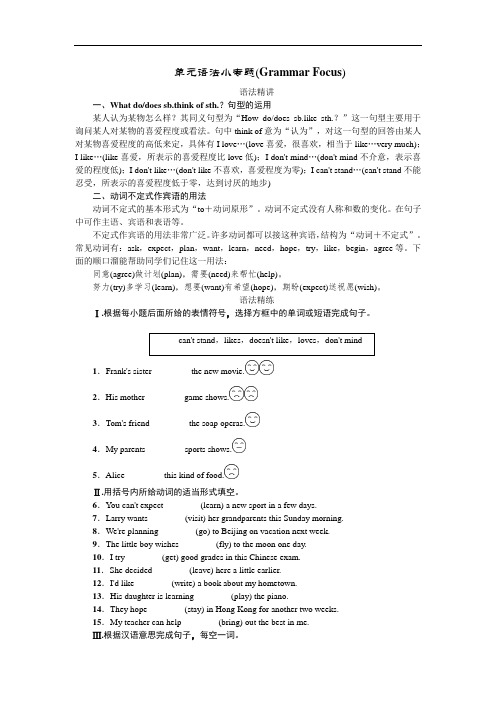
单元语法小专题(Grammar Focus)语法精讲一、What do/does sb.think of sth.?句型的运用某人认为某物怎么样?其同义句型为“How do/does sb.like sth.?”这一句型主要用于询问某人对某物的喜爱程度或看法。
句中think of意为“认为”,对这一句型的回答由某人对某物喜爱程度的高低来定,具体有I love…(love喜爱,很喜欢,相当于like…very much);I like…(like喜爱,所表示的喜爱程度比love低);I don't mind…(don't mind不介意,表示喜爱的程度低);I don't like…(don't like不喜欢,喜爱程度为零);I can't stand…(can't stand不能忍受,所表示的喜爱程度低于零,达到讨厌的地步)二、动词不定式作宾语的用法动词不定式的基本形式为“to+动词原形”。
动词不定式没有人称和数的变化。
在句子中可作主语、宾语和表语等。
不定式作宾语的用法非常广泛。
许多动词都可以接这种宾语,结构为“动词+不定式”。
常见动词有:ask,expect,plan,want,learn,need,hope,try,like,begin,agree等。
下面的顺口溜能帮助同学们记住这一用法:同意(agree)做计划(plan),需要(need)来帮忙(help)。
努力(try)多学习(learn),想要(want)有希望(hope),期盼(expect)送祝愿(wish)。
语法精练Ⅰ.根据每小题后面所给的表情符号,选择方框中的单词或短语完成句子。
can't stand,likes,doesn't like,loves,don't mind1.Frank's sister ________ the new movie.2.His mother ________ game shows.3.Tom's friend ________ the soap operas.4.My parents ________ sports shows.5.Alice ________ this kind of food.Ⅱ.用括号内所给动词的适当形式填空。
人教版九年级英语上册课件:Unit 2单元语法小专题(Grammar Focus)
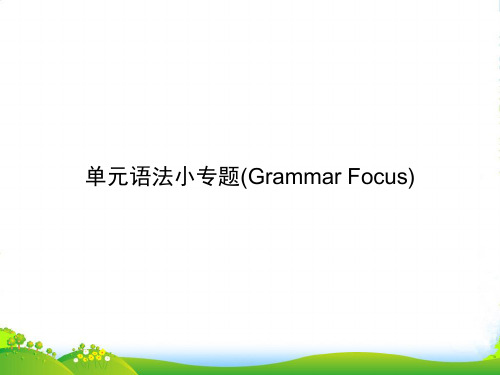
take you to dinner,but I won’t finish
working until ten o’clock.
• A.that
• B.if
• C.what
• D.why
• Ⅲ.句型转换。 • 1.Can they speak French?I want to
know.(合为一句)
• I waFnrtetnockhn.iof/wwhether they can speak
• 4.How clever boys your class has!
• Ⅱ.单项选择。
• A( )1.—
sweet music!
• —And I really like the TV program The Voice of China.
• A.What
• B.What a
• C.How
• D.How a
• He asked the laif/dwyhether she
was
doing the dishes.
• 4.They are happy to see each other.(改为感叹句)
• Hootwherh! appy
they are to see each
• 5.She is a kind girl.(改为感叹句)
• 我认为杰克不能独立完成他的家庭作业。
• Ⅰ.用what,what a(n)或how填空。 • 1.How fast you run!
• 2W.hat a pretty girl your daughter is!
What
• 3. moWmheatnt!
good news it is at the
《名校课堂》2016年秋九年级英语人教版练习:Unit 7 单元语法小专题
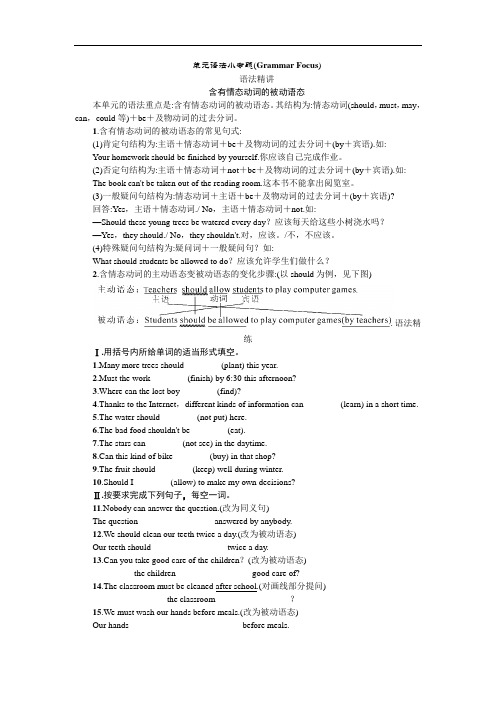
单元语法小专题(Grammar Focus)语法精讲含有情态动词的被动语态本单元的语法重点是:含有情态动词的被动语态。
其结构为:情态动词(should,must,may,can,could等)+be+及物动词的过去分词。
1.含有情态动词的被动语态的常见句式:(1)肯定句结构为:主语+情态动词+be+及物动词的过去分词+(by+宾语).如:Your homework should be finished by yourself.你应该自己完成作业。
(2)否定句结构为:主语+情态动词+not+be+及物动词的过去分词+(by+宾语).如:The book can't be taken out of the reading room.这本书不能拿出阅览室。
(3)一般疑问句结构为:情态动词+主语+be+及物动词的过去分词+(by+宾语)?回答:Yes,主语+情态动词./ No,主语+情态动词+not.如:—Should these young trees be watered every day?应该每天给这些小树浇水吗?—Yes,they should./ No,they shouldn't.对,应该。
/不,不应该。
(4)特殊疑问句结构为:疑问词+一般疑问句?如:What should students be allowed to do?应该允许学生们做什么?2.含情态动词的主动语态变被动语态的变化步骤:(以should为例,见下图)语法精练Ⅰ.用括号内所给单词的适当形式填空。
1.Many more trees should ________(plant) this year.2.Must the work ________(finish) by 6:30 this afternoon?3.Where can the lost boy ________(find)?4.Thanks to the Internet,different kinds of information can ________(learn) in a short time.5.The water should ________(not put) here.6.The bad food shouldn't be ________(eat).7.The stars can ________(not see) in the daytime.8.Can this kind of bike ________(buy) in that shop?9.The fruit should ________(keep) well during winter.10.Should I ________(allow) to make my own decisions?Ⅱ.按要求完成下列句子,每空一词。
人教九年级英语上册课件:Unit 6单元语法小专题(Grammar Focus)

• 一般过去时的被动语态
•
一般过去时的被动语态的构成:
was/were+及物动词的过去分词。
•
被动语态用法顺口溜:
•
一般过去时,被动用be+done:
•
be形式有两种,主单was主复
were;
•
疑问提前be,否定be后not挤。
• 1.判断时态是一般现在时还是一般过去 时。
Hweaterw.as let to •
bring
some water by my father.
• 4.The teacher made the students copy the text.
• The students wemreade to the text by the teacher.
copy
• 3.Those applwesere cleaned just now.
(clean)
•
4.Liu Hwuias a present on
ghiveernbirthda(gy.ive)
a
book
as
• 5.The shoes by the boy lawsetrewweoerkn.
(wear) out
words.
were copied
• About 30 new words
by the students.
• 2.I didn’t take good care of my sister.
• My sistewr as not taken
good
care of by me.
• 3.My father let him bring some
